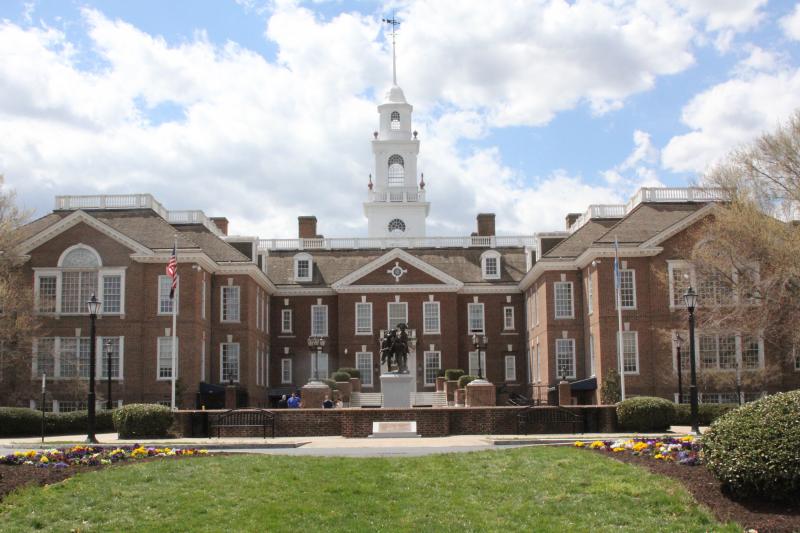State Senate debates gun bills
A package of bills aimed at further regulating the sale and possession of firearms, particularly assault-style weapons, has gone before the state Senate.
The June 16 vote was held too late for press time, but the bills would ban assault weapons and machine guns in Delaware, strengthen background checks for gun purchases, raise the age to purchase most guns from 18 to 21 and allow victims of gun violence to sue gun dealers who sell to straw purchasers.
On June 15, the Senate Executive Committee heard nearly two hours of testimony from 50 speakers on six bills, all related to gun safety. Three of the bills – HB 450, HB 451 and HB 423 – have all passed the House of Representatives and are now in the Senate’s hands. Three more bills – SB 8, SB 302 and SB 323 – have been introduced in the Senate, but not yet voted on by either chamber.
Going through the bills one by one, the least controversial at the June 15 committee hearing was HB 423, which enhances background checks. The bill would create a firearm transaction approval program within the State Bureau of Identification that would serve as the state’s point of contact between federal firearms licensees and federal databases used by the Federal Bureau of Investigation to conduct background checks for gun purchases. The measure passed the house unanimously June 14.
The bill not only aims at strengthening background checks, but cuts down on suspected straw purchasing. The measure passed out of committee with three voting favorably and three voting on the merits. Because the measure involves commerce, it has been sent to the Senate Finance Committee for additional review.
SB 323, sponsored by Sen. Brian Pettyjohn, R-Georgetown, is a companion bill to another gun bill, SB 6, which passed the upper chamber June 9 by a 13-7 vote. SB 6, which still has to pass the House, would prohibit large-capacity magazines that can shoot more than 17 rounds of ammunition. Pettyjohn, who voted against SB 6, had previously tried to insert an amendment in that bill that would grant an exception to a Georgetown-based magazine manufacturer that produces magazines that can shoot up to 30 rounds. That amendment was voted down, but has now been brought back as its own separate bill, SB 323. Pettyjohn’s bill was advanced out of committee with two votes favorable, three on the merits and one unfavorable.
HB 451, which passed the house by a 27-13 vote June 14, would raise the age to purchase a gun from 18 to 21, with exceptions for active military personnel or law enforcement officers and people with a license to carry a concealed deadly weapon. Those 18 years or older can also own shotguns, muzzle-loading rifles and deadly weapons other than firearms. The bill also criminalizes weapons that use compressed air or spring to discharge a pellet, slug or bullet larger than a .177 caliber shot, unless the user is a law enforcement officer.
SB 8 bans machine guns, defined as guns that can shoot an entire magazine with a single trigger pull. The bill also bans bump stocks, trigger-crank devices, sawed-off shotguns, and auto sears and Glock switches, which can convert a semiautomatic gun into a machine gun.
SB 302, known as the Keshall “KeKe” Anderson Safe Firearm Sales Act, eliminates shield laws for gun dealers. The act is named for KeKe Anderson, a bystander who was killed in 2016 in a shooting where the gun used was acquired through a straw purchase. Anderson’s family attempted to sue the firearms dealer in 2019, but their case was thrown out because Delaware law granted dealers full immunity from liability, even if the dealer was negligent in selling the firearm.
SB 302 allows shooting victims and their families to sue gun retailers and manufacturers, and be awarded damages if a court finds the retailer acted knowingly and recklessly in selling or manufacturing a firearm.
HB 450 was the most controversial of the bills. It prohibits the sale of 63 assault-style weapons, which are defined as including the likes of Uzis, AR-15s, street sweepers, AK-47s, machine pistols and a variety of semiautomatic guns. Gun owners who currently own such guns will be grandfathered in; their weapons can only be lawfully transferred to family members. There are also limited exceptions for law enforcement personnel. The bill passed the House by a 22-19 margin.
During discussion by the committee, HB 450’s primary Senate sponsor, Sen. Nicole Poore, D-New Castle, said, “I believe that we have the right to protect our families, up to and including owning firearms for our defense, but I also believe our families have the right to go to attend elementary school, to go to college, to attend church, to go to a grocery store or go to a movie theater without the threat of a gunman committing mass murder in a matter of minutes.”
Poore said the language of the bill is similar to the federal assault weapons ban, which was in effect from 1994 until it sunsetted in 2004.
She continued, “This bill will not solve all the problems of gun violence, but I can tell you it will make it significantly harder for the next would-be mass shooter to get his hands on the tools he needs to carry out the next bloodbath in our state.”
Pettyjohn and Sen. Gerald Hocker, R-Ocean View, were the two senators on the committee who opposed the bills. Hocker, a gun shop owner, said of HB 450, “The intent of this bill is only to punish good, law-abiding citizens.” For the most part, Pettyjohn and Hocker chose to save their questions and comments for when the bills go to the Senate floor.
Following the committee’s rundown, the public was allowed to comment, and 50 people registered to do so. Comments were split between those who support the measures and those opposed. Those opposed said the measures were an infringement on Second Amendment rights and would prevent them from being able to defend themselves with a firearm; there were several sign-offs with, “See you in court.”
Those in support included gun-control advocates and several survivors of mass shootings, most notably from the 2017 Las Vegas shooting where a gunman killed 60 and wounded 411.
Ryan Mavity covers Milton and the court system. He is married to Rachel Swick Mavity and has two kids, Alex and Jane. Ryan started with the Cape Gazette all the way back in February 2007, previously covering the City of Rehoboth Beach. A native of Easton, Md. and graduate of Towson University, Ryan enjoys watching the Baltimore Ravens, Washington Capitals and Baltimore Orioles in his spare time.





















































